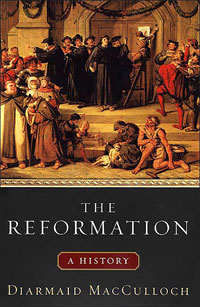A discussion took place in my history book club about Ptolemaic versus Galilean models of the orbits of the planets. As readers no doubt know, Ptolemy thought the earth was stationary and that the sun, moon and planets all revolved around the earth. Galileo thought planetary motion was better explained by the earth and the other planets orbiting around the sun (with moons orbiting around the planets) -- as we do today. The Ptolemaic system, however, had developed complex models with epicycles of the planets around their orbital centers that provided quite accurate forecasts of where the planets could be seen in the sky. One member of the club maintained that the Ptolemaic system's predictions of orbits were more accurate in 1615 than those coming from Galileo.
I was reading The Reformation: a History by Diarmaid MacCulloch which noted that the Gregorian Calendar was promulgated by Pope Gregory XIII in 1582. This was well before Galileo published his views on a heleocentric system in 1615.
The Julian Calendar, used from the time of Julius Cesar, was based on a year of 365 and 1/4 days, and included leap years. The problem is that the solar year is not exactly 365.25 days, and the astronomers in the Vatican Observatory knew that fact. The church had its own astronomers, and while they may have lacked the scientific genius of Galileo, they apparently were pretty good at measuring time and making observations.
The sidereal year's average duration is 365.256363004 mean solar days. Over 15 centuries, Julian calendar actually underestimated the length of the year by 0.006363004 days per year or 9.544508 days. That resulted in Easter, which was scheduled in the church calendar in relation to the Spring Equinox to fall ten days away from the desired actual date. The Pope deleted ten days from the calendar when he started anew.
The mean length of the year in the Gregorian Calendar is 365.2425 days. So the Gregorian Calendar is actually less accurate in terms of the length of the year, but for some centuries it put Easter back in place as determined by the First Council of Nicaea.


No comments:
Post a Comment